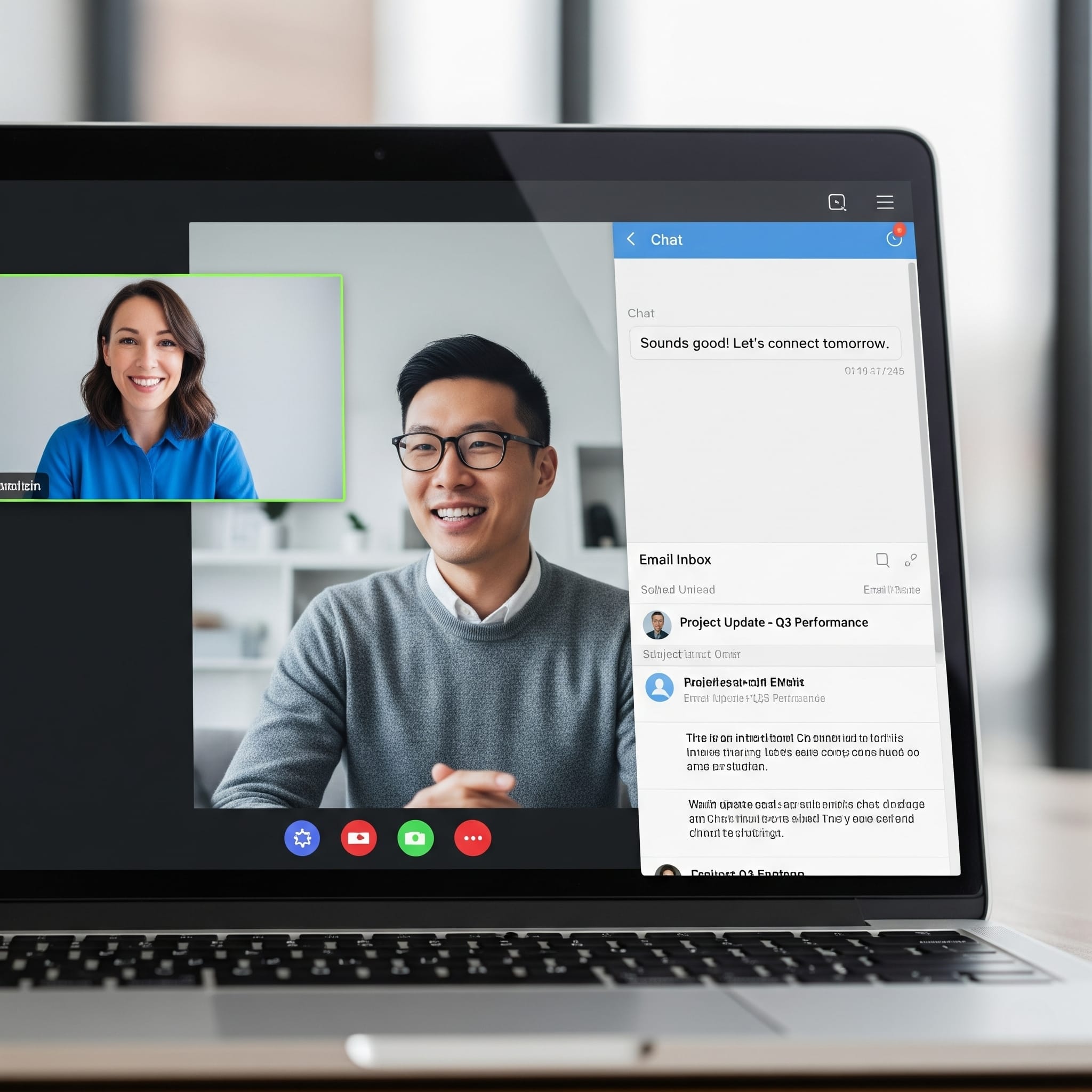Workplace English: 10 Best Communication Skill Tips for Career Success
Discover how Workplace English improves career communication. Learn essential speaking, writing, listening, and non-verbal skills to grow in your career with Clapingo.

Workplace Communication Tips
Why Workplace English Matters
English is the language of global business. Whether you work in India, Europe, or anywhere else, chances are you’ll use English daily at work. From writing emails to presenting ideas in meetings, Workplace English can make or break your career.
Good English doesn’t just mean knowing grammar. It means being able to explain ideas clearly, persuade others, and build trust with colleagues. Strong communication is often the difference between getting noticed for a promotion—or being overlooked.
This blog explores practical communication skills for the workplace, real-life examples, and strategies to build your career communication step by step. If you’ve ever felt nervous before a meeting, struggled to write professional emails, or worried about speaking English fluently, this guide is for you.
Clapingo Tip: At Clapingo, thousands of learners practice workplace English with expert tutors who understand the corporate world. You’ll practice real workplace situations like client calls, interviews, and team presentations.
Why Strong Workplace English Matters
Workplace English is not just about speaking well, it is about impact. Here are a few reasons it matters for your career:
Professional Credibility
Clear communication makes people trust you. If you speak and write confidently, your colleagues and clients will take you more seriously.Career Growth
Promotions often depend on more than technical skills. Leaders need to present ideas, manage teams, and negotiate—all requiring strong career communication.Global Opportunities
Many multinational companies use English as their primary language. Strong Workplace English opens doors to international projects and higher-paying roles.Stronger Teamwork
Miscommunication causes workplace conflicts. Being precise in English ensures better collaboration and smoother projects.
Did You Know?
According to LinkedIn’s 2024 Workplace Learning Report, communication skills are the #1 power skill companies look for in employees.
🔥 Try a demo session and see how quickly your workplace confidence grows.

Role of Active Listening in Workplace Communication
Core Components of Career Communication
Workplace English has four main pillars:
1. Clear Speaking
Your voice is your professional identity. When you speak clearly:
People understand you faster.
Your ideas sound confident.
You avoid awkward misunderstandings.
How to Improve:
Slow down your speech.
Use simple words instead of jargon.
Record your voice and check clarity.
Clapingo Insight: In Clapingo sessions, tutors help you reduce filler words like “umm” and “you know”, making you sound more professional.
2. Active Listening
Listening is as important as speaking. Active listening means you understand not only the words, but also the emotion and intention.
Workplace example:
When your manager gives instructions, repeating key points back shows you listened carefully.
During client calls, asking clarifying questions helps avoid mistakes.
Tips to Practice:
Don’t interrupt; wait until the other person finishes.
Paraphrase what you heard: “So, if I understand correctly, you mean…”
Maintain eye contact and nod occasionally.
3. Effective Writing
Emails, reports, and chat messages are the backbone of workplace communication. Poor writing can create confusion or worse, appear unprofessional.
Golden Rules of Workplace Writing:
Be concise. Avoid long paragraphs.
Use polite, professional tone.
Proofread before sending.
Example:
❌ Wrong: “Send me the report ASAP.”
✅ Correct: “Could you please share the updated report by 3 PM today?”
Pro Tip: Use tools like Grammarly to polish your emails.
4. Non-Verbal Communication
Sometimes what you don’t say matters more. Non-verbal communication includes body language, tone, and facial expressions.
Maintain open posture during meetings.
Smile—it makes you approachable.
Avoid crossing arms (can seem defensive).
Keep your tone steady and calm.
Clapingo Roleplay: Tutors guide you through simulated interviews where you practice both verbal and non-verbal cues for maximum impact.
If your English is holding you back from your next big opportunity—don’t wait.
Book a Clapingo demo and start speaking with confidence in real workplace scenarios.
Practical Strategies to Build Workplace English
Improving your workplace English doesn’t happen overnight. But consistent practice makes you fluent and confident.
1. Daily Habits
Read business articles or company emails every day.
Note down 5–10 workplace phrases (e.g., “circle back,” “let’s align,” “moving forward”).
Speak out loud when practicing emails or presentations.
2. Peer Practice
Pair up with a colleague to review each other’s emails or mock presentations. Feedback helps spot blind spots.
3. Join Professional Platforms
Use LinkedIn to write posts in English. The more you practice public writing, the more natural it feels.
4. Learn Workplace Vocabulary
Instead of “big change,” say “significant shift.”
Instead of “talk about,” say “discuss.”
Did You Know?
Just learning 100 common workplace phrases can improve your confidence in meetings by up to 70%!
Real-Life Workplace Communication Examples
Let’s see how Workplace English plays out in daily professional life:
Example 1: Team Meetings
❌ Wrong: “This is wrong. You didn’t do it properly.”
✅ Correct: “I see where you’re coming from, but we might need to adjust this part for better results.”
Example 2: Email to Client
❌ Wrong: “We will not deliver today.”
✅ Correct: “We regret to inform you that today’s delivery is delayed. We are working to share the updated file by tomorrow morning.”
Example 3: Job Interview
❌ Wrong: “I can do anything. I’m hardworking.”
✅ Correct: “I bring strong project management skills and proven experience leading cross-functional teams.”
Clapingo: Your Partner for Career Communication
Clapingo is not just another English platform. It is built for working professionals.
With Clapingo you get:
1-on-1 sessions with experts who understand workplace needs.
Customized roleplays for meetings, interviews, and client calls.
Instant feedback to avoid repeating mistakes.
Many learners report faster promotions and better confidence within weeks of practicing workplace English with Clapingo.
Try a demo session today and start upgrading your career communication.
🌟 Start with a 15-minute demo and see the difference in your first session itself!
Mastering Email Etiquette in Workplace English
Emails reflect your professionalism. A well-written email can make your communication efficient, respectful, and impactful.
Do’s of Workplace Emails:
✅ Start with a polite greeting (Hi Rahul, Good morning, Dear Team, etc.)
✅ Be clear and concise — avoid unnecessary words.
✅ Use bullet points for easy readability.
✅ End with gratitude or a clear call to action (Thanks, Looking forward to your response).
Don’ts of Workplace Emails:
❌ Avoid slang or informal phrases (Hey dude, FYI only, chill).
❌ Don’t overuse exclamation marks.
❌ Avoid using all caps (it feels like shouting).
📩 Example:
✅ “Hi Meera, Could you please share the client feedback report by tomorrow morning? Thanks!”
Clapingo Practice Tip: Roleplay workplace emails with a tutor. Get instant feedback on tone and grammar before sending that important message.

Workplace Communication
Handling Difficult Conversations Professionally
Every workplace has tough moments — feedback discussions, disagreements, or negotiations. Strong career communication helps you stay calm and constructive.
How to Navigate Difficult Conversations:
Stay calm: Focus on the issue, not the person.
Use neutral language: Instead of “You’re wrong,” say “Let’s look at another approach.”
Show empathy:“I understand your point, and here’s how we can move forward.”
Example:
❌ Wrong: “You never meet deadlines.”
✅ Correct: “I’ve noticed delays lately. How can we plan better to meet targets next time?”
Clapingo Confidence Hack: In mock sessions, tutors simulate real corporate conflicts so you can practice handling them with diplomacy and tact.
Read Also: How to Negotiate Salary in English - Smart Negotiation Tips for Success
Using Storytelling in the Workplace
Storytelling isn’t just for movies—it’s a powerful communication skill in the workplace. Whether you’re pitching an idea or presenting data, stories help people connect emotionally.
How to Use Storytelling in Work Communication:
Start with a real situation: “Last quarter, we faced a 20% drop…”
Add a challenge: “Our team worked around the clock…”
End with a resolution: “The new strategy helped us increase engagement by 35%.”
Why It Works:
Stories make your ideas memorable, emotional, and easier to follow.
Did You Know?
People remember stories 22 times more than plain facts!

Cross-Cultural Communication and Workplace English
Modern workplaces are multicultural. English is the bridge language—but you must also understand tone, politeness, and cultural sensitivity.
Quick Tips for Global Career Communication:
Be culturally aware: Some countries prefer indirect feedback; others appreciate directness.
Mind time zones: When scheduling meetings, use clear time references (“3 PM IST / 9:30 AM GMT”).
Use inclusive language: Avoid idioms that might confuse non-native speakers (“Let’s touch base” → “Let’s connect later”).
Clapingo Global Prep: Practice conversations with tutors who simulate multicultural business contexts; perfect for global professionals and freelancers.
Building Confidence for Presentations and Meetings
Speaking in front of others can be nerve-wracking, even for native speakers. But with the right English phrases and mindset, you can sound clear and confident.
Presentation Success Formula:
Start Strong:“Good morning everyone, thank you for joining.”
Structure Clearly: Use connectors like firstly, moreover, in conclusion.
Engage the Audience: Ask questions like “What do you think about this approach?”
End Powerfully:“In summary, this strategy can double our efficiency.”
Clapingo Pro Tip: Record your presentation, listen to your tone, and note where you can sound more engaging.
Clapingo Advantage: Tutors help professionals master tone, clarity, and confidence through weekly public-speaking drills and mock meetings.
Tired of staying quiet during discussions?
Practice real meeting roleplays with Clapingo mentors who prepare you for every question and curveball.
Conclusion
Workplace English is your career accelerator. It builds credibility, opens doors, and helps you stand out. Whether you’re sending emails, giving presentations, or attending interviews, your communication defines your success.
Final Tip: Don’t wait until your next big meeting to improve. Start small today. Read, write, speak, and practice with experts.
And if you want a faster path? Clapingo gives you a safe space to practice workplace English every day. Book your first session today and watch your career communication transform.
Invest in your growth, start with one demo on Clapingo today.
Read Also: Business English: 10 Tips on How To Give Great Presentations at Work
Comments
Your comment has been submitted